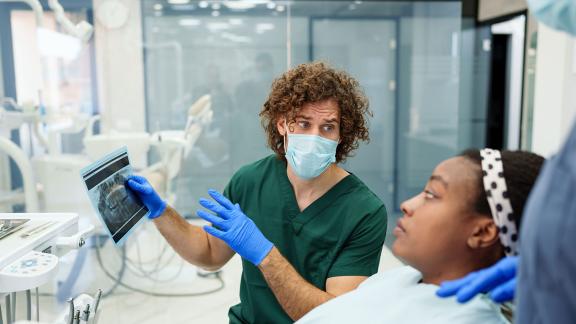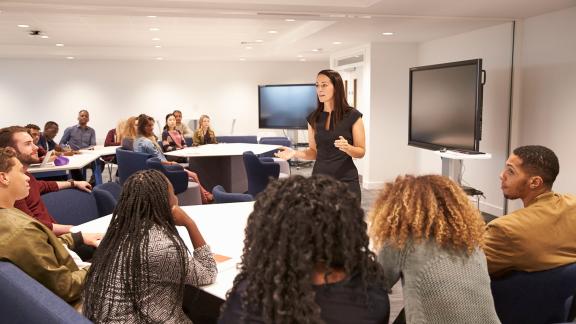Becoming a specialist - a SAS perspective

"The specialist role is arguably the most significant development within postgraduate medical careers in decades."
After the closure of the associate specialist role in 2008, many organisations lobbied for its restoration, to allow career progression and recognition of seniority for the SAS workforce. An agreement in principle to do so came from the secretary of state for Health and Social Care, Matt Hancock in 2018. He included in a letter to the British Medical Association (BMA) that he recognised the need to “extend career development for this important group of doctors”.
However, during the 2021/22 SAS contract reforms across all four nations, the specialist role was formed.
It has a different name and better-defined eligibility, but it is likely to fill a similar niche to the closed associate specialist role. It is described in the accompanying documentation as a “senior” and “experienced” clinician, who will work with “independence” or “autonomy”.
I have previously written about my career using the analogy of a path in a forest, and I have continued this analogy in the talks I give about medical careers.
My own career started fairly conventionally on a reasonably well-signposted path made up of formal training programmes. I graduated from the University of Liverpool, progressed straight into a foundation programme, and progressed from there straight into training in anaesthesia. So far, so well-trodden. There were some hills to be climbed, some rocky patches and a couple of potholes, but for the most part I was able to take these in my stride.
“[I began] to doubt that I was on the right route, or heading in the right direction. I was no longer enjoying the walk.”
Sadly, after five years of anaesthetic training, I began to find it harder to keep progressing down the path. As with all adult learners, my career was only one aspect of my life, and outside of medicine I had met my wife and started a family. Trying to continue down the path of formal training with my newborn daughter was more of a challenge. In addition, some upsetting experiences which I have described in other articles as “monsters on the path” made me begin to doubt that I was on the right route, or heading in the right direction. I was no longer enjoying the walk. While I was struggling with training, I was fortunate to meet some inspirational SAS anaesthetists who were successfully creating their own paths. After much deliberation, I decided to resign my training number, and take a sideward step.
"In short, becoming a specialty doctor gave me back control of my life and my career."
My decision to become a specialty doctor gave me the opportunity to continue my career in anaesthesia in one organisation, with fixed working days and supporting professional activities (SPA) time. I was able to progress in one place, at my own pace, and pursue my clinical and non-clinical interests in a way that better suited me and my circumstances. In short, becoming a specialty doctor gave me back control of my life and my career.
For a short while I was content for my work to be primarily clinical, and I continued to develop greater expertise and skill within my areas of subspecialist interest. While my children were small, I was also able give my life outside of medicine the attention it deserved. I had work-life balance, and after years of feeling like I had no real agency in my own career, it was a blissful thing to achieve.

However, I recognised that many SAS doctors were not necessarily finding their career choice as viable as I was finding mine. I have a childlike sense of fairness, and it is perhaps unsurprising that I rediscovered an aptitude for advocacy. I became a SAS representative for my trust’s local negotiating committee, and a member of the SAS Committee at the Royal College of Anaesthetists. When the opportunity for a larger elected role presented itself, I put myself forward. I was elected as a board member at the Association of Anaesthetists, and shortly afterwards I became chair of its SAS committee.
I rediscovered a passion for delivering education. I became an ALS instructor, and taught many courses a year, for several years. I picked up a role in undergraduate education within my department, and helped to organise the anaesthesia module for the medical students who came to us. I also joined the faculty of several regular multidisciplinary educational events within obstetrics.
I felt I had unfinished business when it came to the postgraduate exams in my specialty, and when my children were both at school, I endeavoured to finish my exam journey. In order to achieve this, I now have the unusual honour of having passed a component of the FRCA qualification twice. I added these letters to my postnominals in 2019.
I continued to walk my own path, stopping to explore and pursue whatever project or opportunity presented itself and interested me. I undertook a large quality improvement project, wrote articles and made a contribution to my specialty. While I took enormous pride in my accomplishments, I started to become a little grumpy that none of them would provide career progression. I had started this part of my journey as a specialty doctor, and I was still a specialty doctor.
"For doctors like me, the specialist role describes who we are now, and becoming specialists provides an opportunity for us to see the career progression that we have earned."
I contemplated trying to become a consultant by Certificate of Eligibility for Specialist Registration (CESR) and began to gather some evidence towards that goal. However, the pandemic and a poorly timed curriculum change together conspired against me. Even for those of us choosing to walk our own path through medicine, circumstances are not always within our control, much though we might wish for them to be.
This brings us back nicely to the beginning of this blog. For doctors like me, the specialist role describes who we are now, and becoming specialists provides an opportunity for us to see the career progression that we have earned. For those who are perhaps not quite ready for this progression, it provides an incentive for professional development and a goal to work towards. For those earlier in their SAS careers, or doctors currently struggling inside or outside of a training programme, the SAS contract reform signposts routes that they might not have yet considered.
"The specialist role comes with a more generous pay scale, but the validation of my journey has been far more valuable to me."
I would strongly encourage every trust to recruit specialty doctors, retain those doctors by supporting their development, and then recognise that development by creating specialists. If you don’t believe you have a service need for these doctors during a workforce crisis, I would suggest you check again.
After moving my career to a forward-thinking trust, earlier this year I became a specialist. In doing so my trust has recognised me as an experienced, senior colleague, and empowered me to work autonomously within my areas of expertise. The specialist role comes with a more generous pay scale, but the validation of my journey has been far more valuable to me.
As I am fond of repeating in my talks and other articles, there is more than one way to be a doctor, and alternative career pathways need parity of esteem.
Dr Robert James Fleming MBChB FRCA, Specialist (SAS) Anaesthetist, Sherwood Forest Hospitals NHS Foundation Trust.




